Martin Luther (1483-1546) was a German monk and professor of theology. He was the most important figure in the Reformation which challenged the power of the Catholic Church.
Random Quotes
Wrong!
Unfortunately wrong answer.
Try again!
The answer was
OK
Work never killed anybody, but through idleness people loose life and limb, because man was born to work like a bird was born to fly.
Correct!
Work never killed anybody, but through idleness people loose life and limb, because man was born to work like a bird was born to fly.
Year:
Author Bio:
Source:
Quote: Heinz-Josef Bontrup (2009): Arbeit und Kapital. Wirtschaftspolitische Bestandsaufnahme und Alternativen. In: Johannes Rehm / Hans G. Ulrich (Hrsg.): Menschenrecht auf Arbeit? Sozialethische Perspektiven, Stuttgart: Kohlhammer, p. 164.
Picture: Wikimedia.
Context:
 Luther saw work as a form of service, stressing that both secular and spiritual professions were of equal value. Over the following centuries, the Protestant conception of work served as one of the ideological arguments for justifying the imprisonment in workhouses of those not considered hardworking. In Calvinism in particular, property and wealth were viewed as signs of divine pleasure. In The Protestant Ethic and the Spirit of Capitalism (1904/1905), the sociologist Max Weber described the close connection between the Protestant work ethic and capitalism.
Luther saw work as a form of service, stressing that both secular and spiritual professions were of equal value. Over the following centuries, the Protestant conception of work served as one of the ideological arguments for justifying the imprisonment in workhouses of those not considered hardworking. In Calvinism in particular, property and wealth were viewed as signs of divine pleasure. In The Protestant Ethic and the Spirit of Capitalism (1904/1905), the sociologist Max Weber described the close connection between the Protestant work ethic and capitalism.
Further Reading:
*BBC (27.03.2014): In Our Time. Weber’s The Protestant Ethic.
OK
White Man’s work eat people.
Correct!
White Man’s work eat people.
Year:
Author Bio:
Mossi proverb from what was then Upper Volta and is today Burkina Faso.
Source:
Quote: John C. Caldwell (1990): The Social Repercussions of Colonial Rule: Demographic Ascpects. In: Albert Adu Boahen (Hrsg): General History of Africa. VII. Africa under Colonial Domination 1880-1935. London: Heinemann, p. 475. The year (1900) is an approximation.
Picture: Wikimedia
Context:
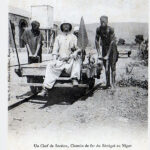 Enslaved Africans were forced to work on colonisers’ plantations and infrastructure projects (Linebaugh and Rediker, 2008: 16, German edition). For example, in the early 20th century, before WW1, one fifth of the ‘workforce’ in the German colony of Cameroon (150 to 200 people of every 1000, see Caldwell, 1990) died of the hardships and diseases of plantation and railway construction work. This high mortality rate was also at the root of the Mossi proverb in today’s Burkina Faso.
Enslaved Africans were forced to work on colonisers’ plantations and infrastructure projects (Linebaugh and Rediker, 2008: 16, German edition). For example, in the early 20th century, before WW1, one fifth of the ‘workforce’ in the German colony of Cameroon (150 to 200 people of every 1000, see Caldwell, 1990) died of the hardships and diseases of plantation and railway construction work. This high mortality rate was also at the root of the Mossi proverb in today’s Burkina Faso.
Further Reading:
*John C. Caldwell (1990): The social repercussions of colonial rule: demographic ascpects. In: Albert Adu Boahen (Hrsg): General History of Africa. VII. Africa under Colonial Domination 1880-1935. London: Heinemann, S. 458-486.
*Peter Linebaugh & Marcus Rediker (2000): The Many-headed Hydra. New York: Verso.
OK
There were 60,000 people living on this island, including the Indians; so that from XXXX to XXXX, over 3,000,000 people had perished from war, slavery, and the mines. Who in future generations will believe this? I myself writing it as a knowledgeable eyewitness can hardly believe it.
Correct!
There were 60,000 people living on this island, including the Indians; so that from XXXX to XXXX, over 3,000,000 people had perished from war, slavery, and the mines. Who in future generations will believe this? I myself writing it as a knowledgeable eyewitness can hardly believe it.
Year:
Author Bio:
Bartolomé de las Casas (1484-1566) was a member of the Dominican Order and active as a bishop in the Spanish colonies in America. The Valladolid dispute (1550-1551) between de las Casas and the philosopher Juan Ginés de Sepúlveda dealt with the question of the legitimacy of the enslavement of the indigenous population of America. Sepúlveda represented the interests of Spanish landowners, de las Casas pointed out the violent acts of the Spaniards. The missing dates are 1494 and 1508, a period of 14 years.
Source:
Howard Zinn (1980): The People’s History of The United States. New York: Harper Collins.
Context:
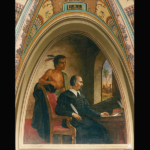 In the first century of America’s occupation, the population decreased by approximately 75 million (95% in some areas) as a consequence of imported disease and murder (Federici 2009: 85f.). As early as the 1560s, there were resistance movements against the Spaniards. For example, members of the Taki Onqoy movement (1560-1572), which arose in what is now Peru, were opposed to any cooperation with the Europeans and advocated an alliance of Andean indigenous peoples to end European colonisation. They rejected Christianity and Christian names as well as food or other consignments from the Spaniards, they paid no tribute and did not work for the conquerors (Stern 1982: 50ff.).
In the first century of America’s occupation, the population decreased by approximately 75 million (95% in some areas) as a consequence of imported disease and murder (Federici 2009: 85f.). As early as the 1560s, there were resistance movements against the Spaniards. For example, members of the Taki Onqoy movement (1560-1572), which arose in what is now Peru, were opposed to any cooperation with the Europeans and advocated an alliance of Andean indigenous peoples to end European colonisation. They rejected Christianity and Christian names as well as food or other consignments from the Spaniards, they paid no tribute and did not work for the conquerors (Stern 1982: 50ff.).
Further Reading:
*Steven J. Stern (1982): Peru‘s Indian Peoples and the Challenge of Spanish Conquest. Huamanga to 1640. Madison: University of Wisconsin Press, S. 50ff.
*Silvia Federici (2009): Caliban and the Witch. Women, the Body and Primitive Accumulation. New York: Autonomedia.
OK
Long before they joined the “official” liberation struggle, African women were part of an ongoing history of resistance to colonialism. (…) opposition movements against colonialism. Not only did they actively participate in protests, but in many cases, they took on leadership roles in organising protests, strikes, demonstrations, work refusal campaigns, civil disobedience and other forms of resistance throughout the history of their countries.
Correct!
Long before they joined the “official” liberation struggle, African women were part of an ongoing history of resistance to colonialism. (…) opposition movements against colonialism. Not only did they actively participate in protests, but in many cases, they took on leadership roles in organising protests, strikes, demonstrations, work refusal campaigns, civil disobedience and other forms of resistance throughout the history of their countries.
Year:
Author Bio:
Micere Mugo (born 1942) is a Kenyan author, poet and activist. She had to leave Kenya in 1982 because of her political activism.
Source:
Micere Mugo (2010, in German): Die Rolle der Frauen in afrikanischen Befreiungsbewegungen – Ein illustratives Beispiel aus Kenia. In: Africavenir (Hrsg.): 50 Jahre afrikanische Un-Abhängigkeiten – Eine (selbst)kritische Bilanz, p.48-55.
Context:
 Women have played an important role in resistance movements: in Europe (see Federici 2009 for a historical overview), in Latin America (see Linhard 2005 on the Mexican revolution) and in Asia (rjb & ir 2008: 100f). In West Africa, the combative Dahomey fought in the 18th and 19th centuries, as described by Stanley Alpern in his book “Amazons of Black Sparta” (2011). There are also testimonies of female fighters in the Mau Mau war against German colonial rulers (Mugo 2004), as well as in the independence movements of the second half of the 20th century (on Zimbabwe, see Sinclair, 1996).
Women have played an important role in resistance movements: in Europe (see Federici 2009 for a historical overview), in Latin America (see Linhard 2005 on the Mexican revolution) and in Asia (rjb & ir 2008: 100f). In West Africa, the combative Dahomey fought in the 18th and 19th centuries, as described by Stanley Alpern in his book “Amazons of Black Sparta” (2011). There are also testimonies of female fighters in the Mau Mau war against German colonial rulers (Mugo 2004), as well as in the independence movements of the second half of the 20th century (on Zimbabwe, see Sinclair, 1996).
Further Reading:
*Micere Githae Mugo (2004): Muthoni Wa Kirima: Mau Mau woman field marshal: interrogation of silencing, erasure, and manipulation of female combatants’ texts. Harare: Sapes Books.
*Stanley B. Alpern (2011): Amazons of Black Sparta: The Women Warriors of Dahomey. New York: New York University Press.
*Silvia Federici (2009): Caliban and the Witch. Women, the Body and Primitive Accumulation. New York: Autonomedia.
*Ingrid Sinclair (1996): Flame. (Documentary on female Guerillas in liberation struggle in Zimbabwe).
*Rheinisches JournalistInnenbüro & recherche international e.V (2008, in German): Die dritte Welt im Zweiten Weltkrieg. Unterrichtsmaterialien zu einem vergessenen Kapitel der Geschichte.
*Tabea Alexa Linhard (2005): Fearless Women in the Mexican Revolution and Spanish Civil War. Columbia: University of Missouri Press.
OK
“We have been recently witnessing a terrific growth of the Jewish population of our town, mainly due to the daily arrival and settlement here of many new families coming from various places. If this current of settlement here goes on for some time, Kavalla will acquire within a few years the appearance of an entirely Jewish town and will be transformed into a second Salonica. This settlement is unfortunately considerably facilitated by the three big Jewish factories that exist in our town, owned by Allatini, Vix and Eskenazy, who are gradually substituting little by little their current Greek workers with Jew ones. If your Excellency agrees that we take various serious measures against the Jews, in cooperation with the [local Greek Orthodox] Community, and wage a systematic underground economic war against them, we can probably check a little bit this current and curb their settlement here that is growing day by day”.
Correct!
“We have been recently witnessing a terrific growth of the Jewish population of our town, mainly due to the daily arrival and settlement here of many new families coming from various places. If this current of settlement here goes on for some time, Kavalla will acquire within a few years the appearance of an entirely Jewish town and will be transformed into a second Salonica. This settlement is unfortunately considerably facilitated by the three big Jewish factories that exist in our town, owned by Allatini, Vix and Eskenazy, who are gradually substituting little by little their current Greek workers with Jew ones. If your Excellency agrees that we take various serious measures against the Jews, in cooperation with the [local Greek Orthodox] Community, and wage a systematic underground economic war against them, we can probably check a little bit this current and curb their settlement here that is growing day by day”.
Year:
Author Bio:
Nikolaos Souidas (Greek Vice-Consul in Kavalla) to the Foreign Minister Alexandros Skouzes, Kavalla, Sept. 29, 1907, No.407.
Source:
Historical Archive of the Greek Foreign Ministry, file 1907/5
Context:
The preponderance of the Israelite community of Salonica, the main harbor and city of Ottoman Macedonia (61.439 inhabitants or 39% of its population according to the first Greek census in 1913), was considered as a negative factor for Greek irredentism. Kavalla was the region’s second port. According to the Ottoman census of 1905, it was inhabited mostly by Greek-speaking Orthodox Christians (11.242) and Moslem Turks (8.562), plus 1.862 Jews and around 1.000 unregistered Slav sojourners; it was, therefore, considered as one of the main Greek strongholds in Southern Macedonia. The Greek politico-military apparatus had already been waging since 1906 a drastic economic war, coupled with a number of terrorist attacks, against the smaller Bulgarian communities in both Salonica and Kavalla. In Salonica, recommendations by local Greek merchants for an enlargement of the scope of such operations, in order to hit their Jew professional rivals, were tactfully turned down by the leaders of the Greek Organization, who were very conscious to avoid an eventual dangerous backlash. It seems that. for similar reasons, the Vice-Consul’s suggestion for “a systematic underground economic war against the Jews” in Kavalla did not materialize. The town was finally incorporated into the Greek state after the second Balkan war, in 1913.
Further Reading:
Mark Mazower, Salonica, City of Ghosts. Christians, Moslems and Jews, 1430-1950. N. York: Alfred A. Knopf, 2005, pp.252-254; Αθανάσιος Σουλιώτης Νικολαΐδης, Ο Μακεδονικός Αγών. Η Οργάνωσις Θεσσαλονίκης, 1906-1908. Απομνημονεύματα, Thessaloniki: Society for Macedonian Studies – Institute for Balkan Studies, 1959.
OK
I heard white people say N***** to me in kindergarten
Don’t question the stereotypes, hit brothers now
We demand more than equal rights, we want peace once and for all
To have new goals and not the image of dealers
A motion is being discussed in Parliament
And meanwhile the next Nazi is planning his attack
The attack is regretted, but I ask myself:
“Why is there another Black family at the grave?”
Correct!
I heard white people say N***** to me in kindergarten
Don’t question the stereotypes, hit brothers now
We demand more than equal rights, we want peace once and for all
To have new goals and not the image of dealers
A motion is being discussed in Parliament
And meanwhile the next Nazi is planning his attack
The attack is regretted, but I ask myself:
“Why is there another Black family at the grave?”
Year:
Author Bio:
Brothers Keepers is an association of predominantly Black musicians who have joined forces due to increasing racism in Germany, in order to draw attention to the difficult, sometimes life-threatening situation for people with a migration background, Blacks and people of colour. The lyrics are from the song Adriano (Last Warning), the part from which the quote is taken is rapped by Samy Deluxe and D-Flame.
Source:
Brothers Keepers (2001): Adriano (Letzte Warnung).
Context:
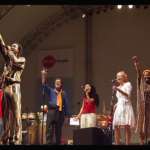 Brothers Keepers, an association of mainly Black musicians from Germany, sang about the murder of Alberto Adriano on June 5, 2000 in their song Adriano. Adriano Alberto, father of three, was brutally beaten by three Nazis, dying of his injuries a few days later. With this song, Brothers Keepers also wanted to draw attention to the intensification of racism, which increased significantly after the fall of the Wall. They also directed their critique at the political sphere, and at the lack of interest in racism and people affected by racism. This song can also be understood as a form of resistance and an announcement by self-organised Black musicians that they refuse to accept racism in Germany any longer.
Brothers Keepers, an association of mainly Black musicians from Germany, sang about the murder of Alberto Adriano on June 5, 2000 in their song Adriano. Adriano Alberto, father of three, was brutally beaten by three Nazis, dying of his injuries a few days later. With this song, Brothers Keepers also wanted to draw attention to the intensification of racism, which increased significantly after the fall of the Wall. They also directed their critique at the political sphere, and at the lack of interest in racism and people affected by racism. This song can also be understood as a form of resistance and an announcement by self-organised Black musicians that they refuse to accept racism in Germany any longer.
Further Reading:
*Advanced Chemistry (1992): Fremd im eigenen Land.
*Samy Deluxe (2001): Weck mich auf.
*SXTN (2016): Ich bin schwarz.
*Ah Nice (2016): Ich bin Schwarz.
OK
“A man counts as a man in virtue of his manhood alone, not because he is a Jew, Catholic, Protestant, German, Italian, etc.”
Correct!
“A man counts as a man in virtue of his manhood alone, not because he is a Jew, Catholic, Protestant, German, Italian, etc.”
Year:
Author Bio:
Georg Wilhelm Friedrich Hegel (1770-1831) was a philosopher of German Idealism.
Source:
Quote: Georg Friedrich Wilhelm Hegel (1896): Philosophy of Right, translated and first Published: S W Dyde, G Bell: London 1896.
Picture: Lazarus Gottlieb Sichling/ Nach Friedrich Julius Ludwig Sebbers – Wikimedia, Creative Commons.
Context:
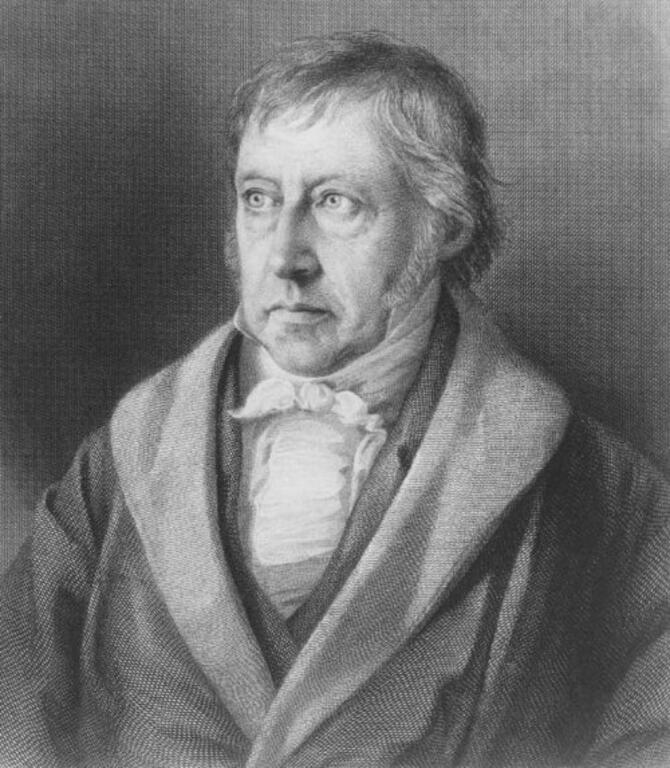 In particular in his lectures, Hegel repeatedly makes racist arguments. He describes the inhabitants of the socalled sub-Saharan Africa as “a child nation”, who could “so easily be made into slaves” due to their lack of consciousness of personality. In the quote here, Hegel emphasizes that in modern bourgeois society all people are equal, regardless of religion or nationality. The condition for this, however, is that this legal equality must first be achieved historically. This idea harbors the possibility of devaluing other forms of life that do not correspond to the European, modern, bourgeois order as underdeveloped.
In particular in his lectures, Hegel repeatedly makes racist arguments. He describes the inhabitants of the socalled sub-Saharan Africa as “a child nation”, who could “so easily be made into slaves” due to their lack of consciousness of personality. In the quote here, Hegel emphasizes that in modern bourgeois society all people are equal, regardless of religion or nationality. The condition for this, however, is that this legal equality must first be achieved historically. This idea harbors the possibility of devaluing other forms of life that do not correspond to the European, modern, bourgeois order as underdeveloped.
Further Reading:
*Jamila Mascat (2022): Race, Feminism and Critical Race Theories: What’s Hegel Got to Do with It?, in: Lettow, S., Pulkkinen, T. (eds.): The Palgrave Handbook of German Idealism and Feminist Philosophy. Palgrave Handbooks in German Idealism. Londing: Palgrave Macmillan, p. 329-349.
*Michael Hardimon (2024): Where Did Hegel Go Wrong on Race? Hegel Bulletin 45(1), p. 23-42.
OK
Turkish people’s supposed “work ethic” satisfied the economy’s demands: they were viewed as young, strong, unskilled, disciplined and passive, or, as it says in the correspondence between a local authority and the German Federal Employment Agency, ‘the Turk (…) if he is handled correctly, can be integrated and exploited.’
Correct!
Turkish people’s supposed “work ethic” satisfied the economy’s demands: they were viewed as young, strong, unskilled, disciplined and passive, or, as it says in the correspondence between a local authority and the German Federal Employment Agency, ‘the Turk (…) if he is handled correctly, can be integrated and exploited.’
Year:
Author Bio:
Employee of the Westphalian-Lippian Landscape Association which oversees social and youth work as well as assistance for people with special needs.
Source:
Quote: Jörg Huwer (2014): Gastarbeiter im Streik. Die Arbeitsniederlegung bei Ford Köln im August 1973. Köln: DOMiD, p. 23.
Picture: Ford73 Blogspot
Context:
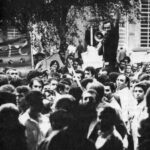 The booming West-German post-war economy needed workers, but did not want to pay high wages. German politics and business argued that workers from southern Europe and North Africa could get paid less. And because they had no collective bargaining agreements, so they did not have the same employment rights. The quote shows how workers were characterised during the 20th century (with no mention of structural descrimination, they were constructede as deficient individuals, Türkmen, 2017: 50). Increasingly, however, these workers organised themselves. In 1973, 6,000 Turkish workers at Ford in Cologne went out on a ‘wildcat strike’ which was sparked by strict vacation regulations. The strike was defeated, amongst other things, by thugs hired by factory management (Betriebszelle Ford, 1973: 68).
The booming West-German post-war economy needed workers, but did not want to pay high wages. German politics and business argued that workers from southern Europe and North Africa could get paid less. And because they had no collective bargaining agreements, so they did not have the same employment rights. The quote shows how workers were characterised during the 20th century (with no mention of structural descrimination, they were constructede as deficient individuals, Türkmen, 2017: 50). Increasingly, however, these workers organised themselves. In 1973, 6,000 Turkish workers at Ford in Cologne went out on a ‘wildcat strike’ which was sparked by strict vacation regulations. The strike was defeated, amongst other things, by thugs hired by factory management (Betriebszelle Ford, 1973: 68).
Further Reading:
*Transversal (10/2017): “Lotta Continua in Frankfurt, Terror of Turks in Cologne. Migrant Struggles in the History of the Federal Republic of Germany.”
*Ceren Türkmen (2017). Gastarbeitsgeschichte zwischen Migrationsregime, Staat und kommunaler Befreiung. Methoden zur Wissensproduktion, Material & Machtkritik. In glokal: Connecting the Dots. Lernen aus Geschichte(n) zu Unterdrückung und Widerstand.
*Betriebszelle Ford der Gruppe Arbeiterkamps (1973): Streik bei Ford Köln.
OK
I can‘t see that there is a difference between black or white … The difference could be that … and this is not the fault of the individual – that the culture is not the same, or that they have not reached the same level that we have.
Correct!
I can‘t see that there is a difference between black or white … The difference could be that … and this is not the fault of the individual – that the culture is not the same, or that they have not reached the same level that we have.
Year:
Author Bio:
Anonymous Danish development worker interviewed by Maria Eriksson Baaz for her book Paternalism of Partnership.
Source:
Maria Eriksson Baaz (2005): The Paternalism of Partnership. A Postcolonial Reading of Identity in Development Aid. London: Zed Books. p. 47
Context:
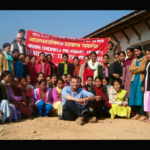 This quote exposes two common ways in which white people conceptualise culture: on the one hand, by completely negating differences and pretending that all people are the same (“colour blindness”). A primary problem with this view is that it does not take power relations into account. On the other hand, the quote also reveals an internalised sense of superiority. White people often assume that they themselves have reached the highest level (across different scales: development, democracy, etc.) and that other people or cultures still need to be developed.
This quote exposes two common ways in which white people conceptualise culture: on the one hand, by completely negating differences and pretending that all people are the same (“colour blindness”). A primary problem with this view is that it does not take power relations into account. On the other hand, the quote also reveals an internalised sense of superiority. White people often assume that they themselves have reached the highest level (across different scales: development, democracy, etc.) and that other people or cultures still need to be developed.
Further Reading:
*Timo Kiesel und Carolin Philipp (2011): White Charity. Blackness and Whiteness in Charity Advertisement. Documentary.
OK
The idea of a good and normalized Germany is opposed to a reality in which people still have to fear that the police will pass on their addresses to Nazis, that weapons are hoarded and that explosives will simply disappear from the stocks of the Bundeswehr. And the anticipation of gratitude for the (not only) Jewish reconciliation obscures the fact that the German history of violence is not over because one side wants it to be. But that it continues to create life-threatening realities in new formations and perpetuate injustice. In the face of this situation, the equation of memory and reconciliation must be called for what it is: an expression of the needs of a section of this society which is ashamed of its actions and wishes this unpleasant story to be resolved very soon. The hope contained therein for normalization from the national anthem to home is part of this wishful thinking. That may be understandable, it may also be politically opportune – but it does not apply to all people who live in this country. And who are heartbroken about what has been done to them and their families. And it will stay that way.
Correct!
The idea of a good and normalized Germany is opposed to a reality in which people still have to fear that the police will pass on their addresses to Nazis, that weapons are hoarded and that explosives will simply disappear from the stocks of the Bundeswehr. And the anticipation of gratitude for the (not only) Jewish reconciliation obscures the fact that the German history of violence is not over because one side wants it to be. But that it continues to create life-threatening realities in new formations and perpetuate injustice. In the face of this situation, the equation of memory and reconciliation must be called for what it is: an expression of the needs of a section of this society which is ashamed of its actions and wishes this unpleasant story to be resolved very soon. The hope contained therein for normalization from the national anthem to home is part of this wishful thinking. That may be understandable, it may also be politically opportune – but it does not apply to all people who live in this country. And who are heartbroken about what has been done to them and their families. And it will stay that way.
Year:
Author Bio:
Germany, Max Czollek, 2021
Max Czollek is a freelance Jewish author and poet born in East Berlin.
Source:
Federal Agency for Civic Education, 2021.
Context:
He did his doctorate at the Center for Research on Antisemitism in Berlin. His best-known works include “Desintegriet dich” (2018) and “Gegenwartsbewältigung (2020).
Further Reading:
https://www.bing.com/videos/search?view=detail&mid=A8EEC67324B8DCF8D0E3A8EEC67324B8DCF8D0E3&q=max czollek friday night jews&shtp=GetUrl&shid=178d3300-a806-4a0b-9190-bc0d58156cd6&shtk=4oCcSWNoIGJpbiBlaW4gc2NobGVjaHRlciBKdWRl4oCdIC0gTWF4IEN6b2xsZWsgenUgR2FzdCBiZWkgRnJlaXRhZ25hY2h0IEpld3MgfCBXRFI%3D&shdk=RGFuaWVsIERvbnNrb3kgaGF0IGdla29jaHQgdW5kIGJpdHRldCBhbSBTY2hhYmJhdC1BYmVuZCB6dSBEaW5uZXIgdW5kIERpc2t1cnM6IGhldXRlIHNlaW5lbiBhbHRlbiBTY2h1bGZyZXVuZCBNYXggQ3pvbGxlayAtIFB1YmxpemlzdCwgT3N0YmVybGluZXIsIEp1ZGUsIHNvIGJlc2NocmVpYnQgQ3pvbGxlayBzaWNoIHNlbGJzdC4gQXVmIGRlbiBUaXNjaCBrb21tZW4ga2FsdGUgQm9yc2NodCAoUm90ZS1CZXRlLVN1cHBlKSB1bmQgZ3LDvG5lciBQZmVmZmkuIFVuZCB2aWVsZSBGcmFnZW4genVtIErDvGRpc2Noc2VpbiB1bmQgenVyIGVpZ2VuZW4gSWRlbnRpdMOkdC4gRGVyIFNjaGF1c3BpZWxlciB1bmQgLi4u&shhk=bDsUB8c0TMIl7v01dxPmh7o5w1%2F%2FdTsoGLMUOvpvmg8%3D&form=VDSHOT&shth=OVP.slGDJpcKfyiVe8NSPrB0pgHgFo
OK
By far the best thing to do is to protect the borders in such a way that they cannot come in the first place. Closing the borders, that would be the best solution. You should give those who are rejected a package for the return trip. This would save both sides from violence. (…) So it would be best to get these unfortunate people out of where they came from as soon and as humanely as possible.
Correct!
By far the best thing to do is to protect the borders in such a way that they cannot come in the first place. Closing the borders, that would be the best solution. You should give those who are rejected a package for the return trip. This would save both sides from violence. (…) So it would be best to get these unfortunate people out of where they came from as soon and as humanely as possible.
Year:
Author Bio:
Golo Mann (1909–1994) was a German-Swiss historian, publicist and writer. He was the son of Thomas Mann, the Nobel prize winner for literature, who had had to leave Germany when the Nazis took power in 1933.
Source:
Bildzeitung from 30. January 1991, quoted from Ulrich Herbert (2001: 305).
Context:
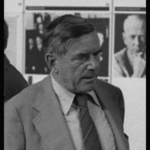 Golo Mann’s defensive attitude towards migrants represents the practice of German foreigner policy since the end of the guest worker agreement in 1973. At the time the quote was written, the deadly arson attacks on migrants and their houses in East and West Germany began: Rostock, Lichtenhagen, Hoyerswerda, Mölln , Solingen. In all cases, the state in East and West Germany failed to provide adequate protection for the victims or a dignified expression of condolences. In debates, it is argued that one can see from the attacks that the Germans have exceeded their resilience limit and that the right to asylum must therefore be abolished. Finally, the right to asylum was radically curtailed by the CDU, CSU and FDP in 1993 with the consent of the SPD.
Golo Mann’s defensive attitude towards migrants represents the practice of German foreigner policy since the end of the guest worker agreement in 1973. At the time the quote was written, the deadly arson attacks on migrants and their houses in East and West Germany began: Rostock, Lichtenhagen, Hoyerswerda, Mölln , Solingen. In all cases, the state in East and West Germany failed to provide adequate protection for the victims or a dignified expression of condolences. In debates, it is argued that one can see from the attacks that the Germans have exceeded their resilience limit and that the right to asylum must therefore be abolished. Finally, the right to asylum was radically curtailed by the CDU, CSU and FDP in 1993 with the consent of the SPD.
Further Reading:
*Ulrich Herbert (2001): Geschichte der Ausländerpolitik in Deutschland. München: C.H. Beck.
*Politics Today (06.06.2018): What Changed 25 Years After the Solingen Arson Attack.
OK
“Until now it has been practice that we have been treated like serfs, which is deplorable, since Christ redeemed all of us with his precious blood, both the shepherd and the nob-leman […]. Accordingly we hereby declare that we are free […].”
Correct!
“Until now it has been practice that we have been treated like serfs, which is deplorable, since Christ redeemed all of us with his precious blood, both the shepherd and the nob-leman […]. Accordingly we hereby declare that we are free […].”
Year:
Author Bio:
Unknown author. The text was adopted after a peasant assembly in Memmingen during the German Peasants’ War (1524-26).
Source:
Quote: Twelve Articles of the Peasants
Picture: Cleveland Museum of Art, Public domain, via Wikimedia Commons,
Context:
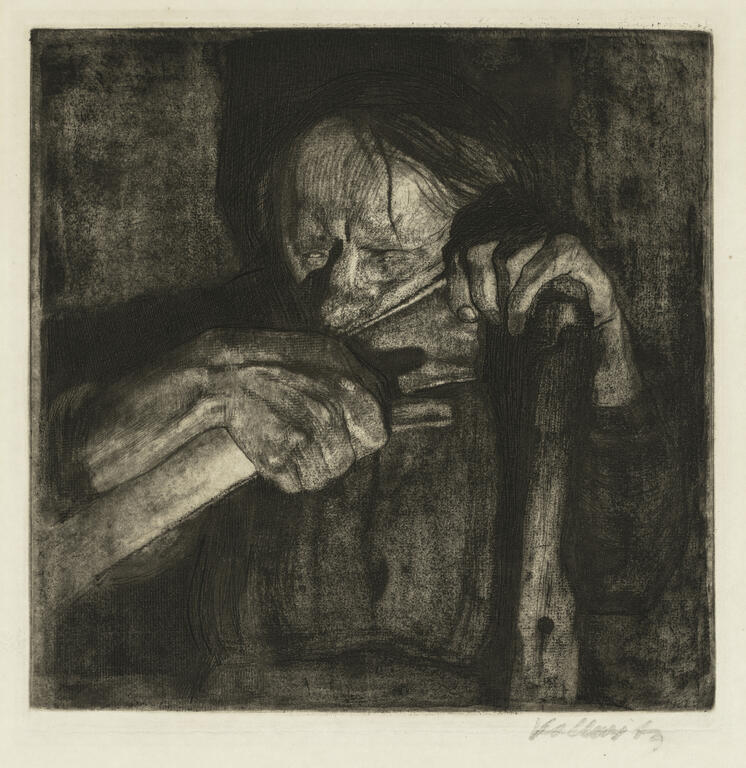 In the aftermath of the Reformation, many peasants saw their belief confirmed that the previous legal order did not represent God’s will and that it was unjust. Drawing from the Bible they argued against the church-sanctioned order. The Twelve Articles of the Peasantry are considered to be an early claim for human rights and freedoms in Europe. In addition to the abolition of serfdom, the claims included the right to hunt and fish, the freedom to elect and depose a pastor, and an independent judiciary. The rebels explicitly referred to Martin Luther (1483-1546), who, however, rejected the uprising and called for the crackdown of the peasant uprisings. The crackdown followed and the Twelve Articles of the Peasantry did not come into force.
In the aftermath of the Reformation, many peasants saw their belief confirmed that the previous legal order did not represent God’s will and that it was unjust. Drawing from the Bible they argued against the church-sanctioned order. The Twelve Articles of the Peasantry are considered to be an early claim for human rights and freedoms in Europe. In addition to the abolition of serfdom, the claims included the right to hunt and fish, the freedom to elect and depose a pastor, and an independent judiciary. The rebels explicitly referred to Martin Luther (1483-1546), who, however, rejected the uprising and called for the crackdown of the peasant uprisings. The crackdown followed and the Twelve Articles of the Peasantry did not come into force.
Further Reading:
*Translation of the entire text here.
*Joshua J. Mark (2022): Twelve Articles. World history encyclopedia.
OK
“No other distinctions exist than those of virtues and talents, nor any other superiority than that granted by the law in the exercise of a public charge. The law is the same for all, whether it punishes or protects.”
Correct!
“No other distinctions exist than those of virtues and talents, nor any other superiority than that granted by the law in the exercise of a public charge. The law is the same for all, whether it punishes or protects.”
Year:
Author Bio:
Independent Republic of Haiti of 1804
Source:
Quote: Art. 5, Haitian constitution 1801.
Picture: Bdx – CC BY-SA 4.0, Wikimedia. Creative Commons.
Context:
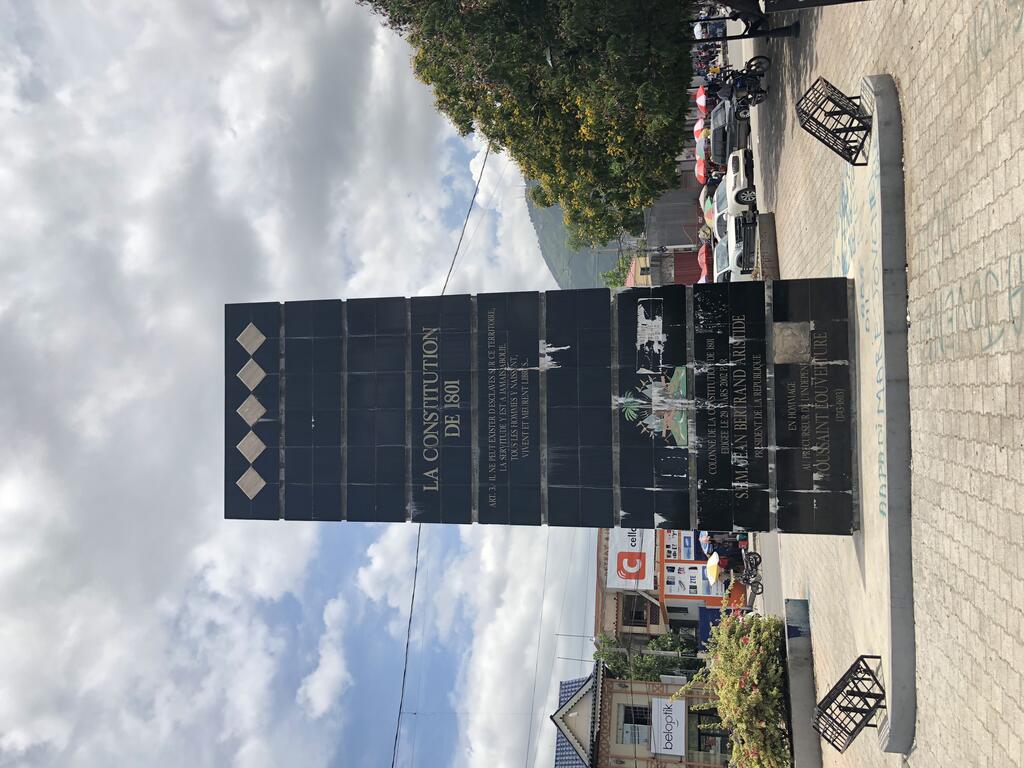 The quote comes from the constitution of St. Dominique (now Haiti) from 1801. In August 1791, black slaves revolted against the French colonial power and freed themselves. After the French National Assembly granted equal rights to all inhabitants of the colonies in 1792, military clashes broke out against white royalists. One protagonist of developing the constitution of 1801 was Toussaint L’Ouverture. He installed himself as governor for life and at the same time brought forth universalist convictions of equality. The constitution led to a political rupture. Napoleon sent military forces. L’Ouvertures‘ army was forced to surrender after three months. St. Dominique became independent in 1804 and was renamed Haiti.
The quote comes from the constitution of St. Dominique (now Haiti) from 1801. In August 1791, black slaves revolted against the French colonial power and freed themselves. After the French National Assembly granted equal rights to all inhabitants of the colonies in 1792, military clashes broke out against white royalists. One protagonist of developing the constitution of 1801 was Toussaint L’Ouverture. He installed himself as governor for life and at the same time brought forth universalist convictions of equality. The constitution led to a political rupture. Napoleon sent military forces. L’Ouvertures‘ army was forced to surrender after three months. St. Dominique became independent in 1804 and was renamed Haiti.
Further Reading:
*Massimiliano Tomba (2019): Insurgent Universality. An Alternative Legacy of Modernity. New York: Oxford University Press.
OK
“Peoples of the World, we American Negroes appeal to you; our treatment in America is not merely an internal question of the United States. It is a basic problem of humanity; of democracy; of discrimination because of race and color […].”
Correct!
“Peoples of the World, we American Negroes appeal to you; our treatment in America is not merely an internal question of the United States. It is a basic problem of humanity; of democracy; of discrimination because of race and color […].”
Year:
Author Bio:
W.E.B. Du Bois (1868-1963) was an American human rights activist and civil rights activist as well as philosopher, sociologist and historian.
Source:
Quote: Letter to the newly founded United Nations: “An Appeal to the World: A Statement of Denial of Human Rights to Minorities in the Case of Citizens of Negro Descent in the United States of America and an Appeal to the United Nations for Redress.”
Picture: By Unknown author. WIkimedia. Creative Commons.
Context:
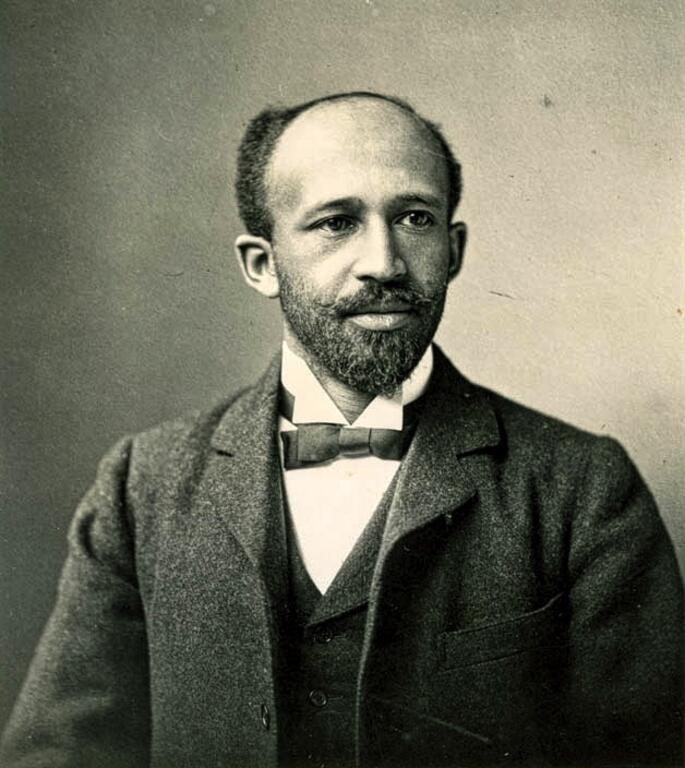 In the letter to the newly founded United Nations and the Universal Declaration of Human Rights implemented with reference to the experiences of National Socialism, Du Bois links the situation of black people in the USA with general questions of human rights. While the USA, as an ally in Europe, was instrumental in the liberation from fascism and injustice, black people in the USA continue to be denied basic rights. Du Bois appeals to the world community not to leave the unjust treatment of black people to the USA as a domestic political problem, but to apply the standard of general humanity and democracy to the USA as well.
In the letter to the newly founded United Nations and the Universal Declaration of Human Rights implemented with reference to the experiences of National Socialism, Du Bois links the situation of black people in the USA with general questions of human rights. While the USA, as an ally in Europe, was instrumental in the liberation from fascism and injustice, black people in the USA continue to be denied basic rights. Du Bois appeals to the world community not to leave the unjust treatment of black people to the USA as a domestic political problem, but to apply the standard of general humanity and democracy to the USA as well.
Further Reading:
*Thomas C. Holt (2008): “Du Bois, W. E. B.“, in: African American National Biography, Henry Louis Gates Jr. a. Evelyn Brooks Higginbotham (eds.). New York: Oxford UP.
*W.E.B. Du Bois (1947): “An Appeal to the World : A Statement of Denial of Human Rights to Minorities…”,
OK
In the real Africa, it is sensuality that hinders man […] These peoples have never surpassed themselves, have never gained a foothold in history. […] This Africa remains in its calm, torpid sensuality which does not propel it forward. It has not yet entered history and has no other connection with history than the fact that its inhabitants were, in more impoverished times, used as slaves.
Correct!
In the real Africa, it is sensuality that hinders man […] These peoples have never surpassed themselves, have never gained a foothold in history. […] This Africa remains in its calm, torpid sensuality which does not propel it forward. It has not yet entered history and has no other connection with history than the fact that its inhabitants were, in more impoverished times, used as slaves.
Year:
Author Bio:
Georg Wilhelm Friedrich Hegel (1770-1831) was one of the most important German Enlightenment philosophers.
Source:
Source of the German original: Karl Bremer (1996): G.W.F. Hegel. Vorlesungen, Ausgewählte Nachschriften und Manuskripte (1822/1823). Bd. 12. Hamburg: Meiner, p. 98-100.
Context:
 During the Enlightenment, the idea emerged that societies owed their ongoing development to reason. In order to achieve a higher level of development, it was considered necessary to control and subjugate nature, along with those people who were termed primitive peoples. According to G.F.W. Hegel, only white people possessed the “reason” necessary for progress, which is why they had to “humanise” the rest of the world. Africa was considered to be a continent without history in which people “did not develop”. Europeans justified colonial violence through the philosophical construction of their superiority.
During the Enlightenment, the idea emerged that societies owed their ongoing development to reason. In order to achieve a higher level of development, it was considered necessary to control and subjugate nature, along with those people who were termed primitive peoples. According to G.F.W. Hegel, only white people possessed the “reason” necessary for progress, which is why they had to “humanise” the rest of the world. Africa was considered to be a continent without history in which people “did not develop”. Europeans justified colonial violence through the philosophical construction of their superiority.
Further Reading:
*Rebekah Nicholson (2006): The Enlightenment and Its Effects on the Haitian
Revolution of 1789-1804.
*Eduardo Grüner (2008): “Haiti: a (forgotten) philosophical revolution.”
OK
All of the Indians, generally speaking, have such a horror and fear of hospitals, that it is not possible to persuade them to go to them to be healed, because they respond that they will die.
Correct!
All of the Indians, generally speaking, have such a horror and fear of hospitals, that it is not possible to persuade them to go to them to be healed, because they respond that they will die.
Year:
Author Bio:
Spanish priest in Oaxaca, Mexico.
Source:
Paul F. Ramirez (2018): Enlightened Immunity: Mexico’s Experiments with Disease Prevention in the Age of Reason. Standford: Stanford University Press, p. 12
Context:
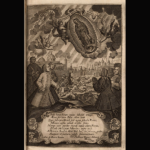 According to Ramirez (2018: 12), many speeches condemned indigenous people who opposed the epidemic measures taken by the Spaniards as “superstitious”. However, their fear was not unfounded, as the first Europeans brought smallpox, measles, flu and typhus with them, against which the indigenous population had no defences. Thus most indigenous people fell victim not to the Europeans’ superior weapons, but to their epidemics. According to scientific estimates, up to 95 percent of the population in large parts of the double continent was killed within just 100 years (Wagner 2020). Today, argues the epidemiologist Rob Wallace, new pathogens in the form of diseases for humans, other fauna and flora are constantly being created, thanks in part to the destruction of nature and habitats, factory farming‚ and the capitalist economy’s promotion of profit over nature, people and health (Wallace 2020).
According to Ramirez (2018: 12), many speeches condemned indigenous people who opposed the epidemic measures taken by the Spaniards as “superstitious”. However, their fear was not unfounded, as the first Europeans brought smallpox, measles, flu and typhus with them, against which the indigenous population had no defences. Thus most indigenous people fell victim not to the Europeans’ superior weapons, but to their epidemics. According to scientific estimates, up to 95 percent of the population in large parts of the double continent was killed within just 100 years (Wagner 2020). Today, argues the epidemiologist Rob Wallace, new pathogens in the form of diseases for humans, other fauna and flora are constantly being created, thanks in part to the destruction of nature and habitats, factory farming‚ and the capitalist economy’s promotion of profit over nature, people and health (Wallace 2020).
Further Reading:
*Der Freitag (Thomas Wagner, 28.09.2020): Der Viren-WirtPandemie Hinter Covid-19 stehen Massentierhaltung und Raubbau, also der Neoliberalismus, erklärt Rob Wallace. Der Freitag 38/2020.
*Rob Wallace (2020): Competing with Nature: COVID-19 as a Capitalist Virus (Interview by Ashley Smith). Spectre Journal 16.10.2020.
OK
(…) because I grew up with the feeling that I live here, I was born here, but that I have to leave here one day. Because the first question is always where do they come from and the second is when are they going, when are they going back. It doesn’t matter if this “back” exists or not. And you can’t be German with Black skin anyway.
Correct!
(…) because I grew up with the feeling that I live here, I was born here, but that I have to leave here one day. Because the first question is always where do they come from and the second is when are they going, when are they going back. It doesn’t matter if this “back” exists or not. And you can’t be German with Black skin anyway.
Year:
Author Bio:
May Ayim (1960-1996) was a German poet, educator and activist in the Afro-German movement.
Source:
May Ayim, Part 3, Minute 0:40 – 1:05.
Context:
 In the documentary Hoffnung im Herz – Mündliche Poesie by Maria Binders, May Ayim describes how, with the self-empowering designation “Afro-German” or “Schwarze Deutsche”, she refused negative racial epithets, which were still quite common in everyday language in the late 1980s. But she noted that even with these more positive developments, little had changed for Afro-Germans. Even today, the prevailing idea is that being German means being white. As a result, the fact of having lived in Germany for several generations still does not mean that people of colour, Black people or people with a migration history can (discursively) be considered German. Last but not least, the media and discourses about the “other” also make it clear who is German and who has yet to be integrated. Within this framework, people of colour or people with a migration background cannot by definition be German. This is despite the fact that the law on nationality was changed in 2000 in such a way that one no longer needs to have “German blood” in order to be German but can, under certain conditions, be German by virtue of having been born in Germany.
In the documentary Hoffnung im Herz – Mündliche Poesie by Maria Binders, May Ayim describes how, with the self-empowering designation “Afro-German” or “Schwarze Deutsche”, she refused negative racial epithets, which were still quite common in everyday language in the late 1980s. But she noted that even with these more positive developments, little had changed for Afro-Germans. Even today, the prevailing idea is that being German means being white. As a result, the fact of having lived in Germany for several generations still does not mean that people of colour, Black people or people with a migration history can (discursively) be considered German. Last but not least, the media and discourses about the “other” also make it clear who is German and who has yet to be integrated. Within this framework, people of colour or people with a migration background cannot by definition be German. This is despite the fact that the law on nationality was changed in 2000 in such a way that one no longer needs to have “German blood” in order to be German but can, under certain conditions, be German by virtue of having been born in Germany.
Further Reading:
*May Ayim (2003): Blues in Black and White. A Collection of Essays, Poetry, and Conversations. Cape Town etc: Africa World Press.
OK
Once you get into enemy territory, you will realise what oppression by the white man means. Imposing, magnificent buildings look down from mountaintops or hills on the tiny huts of the natives. The luxurious lifestyle of the whites is financed with the money that this small minority squeezes out of Asians through bloody oppression.
Correct!
Once you get into enemy territory, you will realise what oppression by the white man means. Imposing, magnificent buildings look down from mountaintops or hills on the tiny huts of the natives. The luxurious lifestyle of the whites is financed with the money that this small minority squeezes out of Asians through bloody oppression.
Year:
Author Bio:
Colonel Masanobu Tsuji (1901-1961) was a Japanese officer, military strategist and politician. He was involved in war crimes during World War II, hid in Thailand after the war to avoid justice, but returned to Japan in 1949 and became a member of parliament.
Source:
Arthur Zich (1980): Die aufgehende Sonne. Der Zweite Weltkrieg. Niederlande: Time-Life-Books, p. 123. The quote was said between 1939 and 1945.
Context:
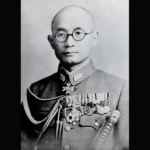 Japan was an ally of Nazi Germany during World War II. ‘Outwardly, Japanese ideologues used anti-colonial (…) rhetoric to stir up resistance against Western colonial powers and to win allies – the slogan was “Asia for Asians“’ (recherche international 2008: 107). Many people, e.g. in Indonesia, first welcomed the Japanese because they drove out Dutch colonial power and abolished their exploitative plantation economy. Japan distributed Dutch possessions to Indonesian peasants. But soon the Japanese obliged many to work as romusha (forced labourers). Around 4 million Indonesians perished in World War II (ibid.: 123). The Indonesian journalist Sunapati described the actions of the Japanese as follows: ‘The wolf goes out the back door, the tiger comes in the front door.’ (ibid.: 107) In other words: ‘The European colonialists ran away, the Japanese fascists came!’ (ibid.).
Japan was an ally of Nazi Germany during World War II. ‘Outwardly, Japanese ideologues used anti-colonial (…) rhetoric to stir up resistance against Western colonial powers and to win allies – the slogan was “Asia for Asians“’ (recherche international 2008: 107). Many people, e.g. in Indonesia, first welcomed the Japanese because they drove out Dutch colonial power and abolished their exploitative plantation economy. Japan distributed Dutch possessions to Indonesian peasants. But soon the Japanese obliged many to work as romusha (forced labourers). Around 4 million Indonesians perished in World War II (ibid.: 123). The Indonesian journalist Sunapati described the actions of the Japanese as follows: ‘The wolf goes out the back door, the tiger comes in the front door.’ (ibid.: 107) In other words: ‘The European colonialists ran away, the Japanese fascists came!’ (ibid.).
Further Reading:
*Rheinisches JournalistInnenbüro; recherche international (2012): Die Dritte Welt im Zweiten Weltkrieg. Unterrichtsmaterialien zu einem vergessenen Kapitel der Geschichte. Köln.
*Care (Comfort Women Action for Redress and Education):
**Mark Caprio (2010): “Neo-Nationalist Interpretations of Japan’s Annexation of Korea: The Colonisation Debate in Japan and South Korea.” In: The Asia-Pacific Journal Volume 8, Issue 44, Number 4.
*Care (Comfort Women Action for Redress and Ed
OK
The barbarian princes cannot prevent their subjects from trading with the Spanish, and the Kings of Spain on their side cannot forbid the Spanish to trade with the Indians.
Correct!
The barbarian princes cannot prevent their subjects from trading with the Spanish, and the Kings of Spain on their side cannot forbid the Spanish to trade with the Indians.
Year:
Author Bio:
Francisco de Vitoria (1483 – 1546) was a Catholic moral theologian, Dominican friar and teacher of natural law. He taught at various universities in Spain and expressed himself in his writings on political issues such as conquests and trade in the Americas. De Vitoria was central to the development of the concepts of “freedom of trade” and “freedom of the seas” (for trade).
Source:
Vitorias Schrift (1532): The First Relectio of the Reverend Father, Brother Franciscus de Victoria, On the Indians Lately Discovered.
Context:
 The right and freedom to travel and trade are seen by de Vitoria as fundamental principles of a natural right. The rights of merchants were placed above any restrictions and protectionism (protection against the import of goods) by noble rulers (princes). However, trade relations were by no means relations between equals. The gold and silver that (according to de Vitoria) ‘the natives have in abundance’ were first obtained through environmentally destructive mining and forced labour, which was dangerous and degrading for workers. German traders and princes even had private colonies in Latin America, Africa and Asia or were involved in the slave trade (Potts 1988: 18). For example, Großfriedrichsburg, in present-day Ghana was a colony of the Great Elector Jakob von Kurland in the 17th century. From 1528 to 1558, Venezuela was a local colony of the Welsers bank (Reader der AG: 4ff.).
The right and freedom to travel and trade are seen by de Vitoria as fundamental principles of a natural right. The rights of merchants were placed above any restrictions and protectionism (protection against the import of goods) by noble rulers (princes). However, trade relations were by no means relations between equals. The gold and silver that (according to de Vitoria) ‘the natives have in abundance’ were first obtained through environmentally destructive mining and forced labour, which was dangerous and degrading for workers. German traders and princes even had private colonies in Latin America, Africa and Asia or were involved in the slave trade (Potts 1988: 18). For example, Großfriedrichsburg, in present-day Ghana was a colony of the Great Elector Jakob von Kurland in the 17th century. From 1528 to 1558, Venezuela was a local colony of the Welsers bank (Reader der AG: 4ff.).
Further Reading:
*Antony T. Anghie (2005): Imperialism, Sovereignty and the Making of International Law. Cambridge: Cambridge University Press.
*Lydia Potts (1988): Weltmarkt für Arbeitskraft. Hamburg: Junius.
*AG Weiße deutsche Frauen und Kolonialismus: „Weiße deutsche Frauen & Kolonialismus – Reader zu einer Veranstaltung.“ C/o Infoladen. Kleiner Schäferkamp 46. 20357 Hamburg.
OK
Getting inefficient state enterprises into private hands is essential for Iraq’s economic recovery.
Correct!
Getting inefficient state enterprises into private hands is essential for Iraq’s economic recovery.
Year:
Author Bio:
Paul Bremer (b. 1941) is a US diplomat and was appointed civil administrator of Iraq in 2003.
Source:
Naomi Klein (2010: 480, German edition)
Context:
 Naomi Klein describes how Bremer sat as a civilian administrator in Saddam Hussein’s palace, receiving trade and investment laws by email and imposing them on the Iraqi people (Klein 2010: 479, German edition). Bremer postponed the elections scheduled for 2003, admitting later elections and a democracy supervised by Washington. In 2007, the Iraqi cabinet passed a law which nullified its own power: amongst other things, it no longer had any right of co-determination during negotiations over oil contracts (ibid.: 527). Southern European countries faced similar situations during the euro crisis: Greek parliamentarians had little say over the sale of public goods, and the heads of the privatisation fund were also immune to prosecution (Die Zeit, 16 June, 2017: Spain threatens to veto aid to Greece).
Naomi Klein describes how Bremer sat as a civilian administrator in Saddam Hussein’s palace, receiving trade and investment laws by email and imposing them on the Iraqi people (Klein 2010: 479, German edition). Bremer postponed the elections scheduled for 2003, admitting later elections and a democracy supervised by Washington. In 2007, the Iraqi cabinet passed a law which nullified its own power: amongst other things, it no longer had any right of co-determination during negotiations over oil contracts (ibid.: 527). Southern European countries faced similar situations during the euro crisis: Greek parliamentarians had little say over the sale of public goods, and the heads of the privatisation fund were also immune to prosecution (Die Zeit, 16 June, 2017: Spain threatens to veto aid to Greece).
Further Reading:
*David Harvey (2003): The New Imperialism. Oxford: University Press.
*Naomi Klein (2007): The Shock Doctrine. The Rise of Disaster Capitalism. Toronto: Knopf Canada.
OK
1500
to 1600
to 1700
to 1800
to 1850
to 1900
to 1925
to 1950
to 1975
to 1990
to 2000
to 2010
2011